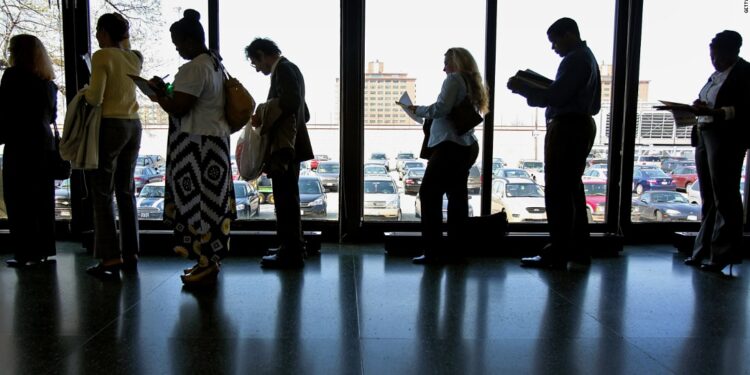Crédito: fuente
Since March, Montgomery — a New Yorker who also works as a voice teacher and tour guide — has not been able to find steady work, but he’s gotten weekly payments thanks to the historic expansion of benefits under the $2 trillion federal stimulus package. But now, with Congress stalled on a fresh relief deal, the Pandemic Unemployment Assistance program will run out just after Christmas.
If that happens, Montgomery and his wife, a part-time home health aide, might go to Japan, where Montgomery’s wife is from, or Hong Kong, where he lived for 12 years and believes he can get work.
«I had hoped our wonderful Congress would have figured it out by now,» said Montgomery, 63. «We would be paying rent. We would be putting that money back into the economy. It’s not as if we are just going to hoard it. We need to spend it.»
A second measure, the Pandemic Emergency Unemployment Compensation program, is also due to expire. That one provides the jobless with an additional 13 weeks of payments after they exhaust their traditional state benefits, which typically last 26 weeks. Some 4.6 million recipients will see these extra payments expire prematurely unless Congress acts, The Century Foundation estimated — and many of those people won’t be eligible for extended state benefits, which can last up to 20 weeks.
March shutdowns have an enduring effect
«We’ve never cut off unemployment benefits when this many people are collecting, when the unemployment rate is this high, this early in a recession,» said Andrew Stettner, senior fellow at The Century Foundation.
Congress, however, has been unable to agree on another stimulus package to extend many of the relief measures it passed in March. Long gone is the $600 federal boost to weekly unemployment benefits, which expired at the end of July despite heavy lobbying by the jobless, consumer advocates and Democrats.
‘Astounding’ inaction in Washington
The «indifference» displayed by lawmakers is «astounding,» said America Caballero, who lost her contract job as a human resources staffer for oil and gas companies in late April.
Caballero will soon exhaust her state benefits, and her pandemic emergency payments will most likely end before she gets the full 13 weeks. She’s concerned the state extended benefits she will then receive will also run out next year before she’s able to find work.
«Every time Congress tries to do something, it breaks down because they can’t get over their differences,» said Caballero, 45, who lives with her mother and sister in a suburb of Houston. «The American people are suffering.»
Meanwhile, job listings have been scarce and fewer have been posted lately, she said. And many of the ones she sees pay $35,000 to $45,000 a year, instead of the more typical $55,000 to $60,000 they offered before the pandemic.
«We want jobs. We don’t want a handout,» said Caballero, who has a master’s degree in business administration. «We want for the economy to stabilize.»
A triple whammy
Gabbie Riley is facing a triple whammy when it comes to landing a new job to replace the one she lost in late March.
She worked in sales for a Minneapolis hotel, focusing on booking clients in sports and entertainment. All of those industries have shriveled up in the pandemic.
While the 39-year-old expects to shift from the Pandemic Emergency Unemployment Compensation program to extended benefits next month, she doesn’t think she’ll be able to find another job before those payments run out in March.
«Congress needs to provide ample support to the individual, the small businesses and large affected businesses until we are out of the woods. Period,» said Riley, who lives in St. Paul, Minnesota, with her son, who attends college virtually.








